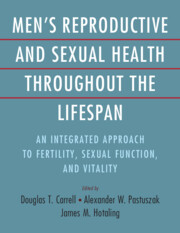 Men's Reproductive and Sexual Health Throughout the Lifespan
Men's Reproductive and Sexual Health Throughout the Lifespan Book contents
- Men’s Reproductive and Sexual Health throughout the Lifespan
- Men’s Reproductive and Sexual Health throughout the Lifespan
- Copyright page
- Contents
- Contributors
- Preface
- Section 1 An Introduction to Men’s Health Care
- Section 2 The Biology of Male Reproduction and Infertility
- Section 3 Clinical Evaluation and Treatment of Male Infertility
- Section 4 Laboratory Evaluation and Treatment of Male Infertility
- Section 5 Medical and Surgical Management of Issues of Male Health
- Chapter 32 Hypogonadism in the Male
- Chapter 33 Selective Androgen Receptor Modulators in the Treatment of Hypogonadism and Men’s Health
- Chapter 34 Male Fertility and Testosterone Therapy
- Chapter 35 Sleep and Men’s Health
- Chapter 36 Molecular Biology and Physiology of Erectile Function and Dysfunction
- Chapter 37 Evaluation of the Male with Erectile Dysfunction
- Chapter 38 Lifestyle Modifications for Erectile Dysfunction
- Chapter 39 Medical and Surgical Management of Erectile Dysfunction
- Chapter 40 Surgical Management of Peyronie’s Disease
- Chapter 41 Medical Management of Benign Prostatic Hyperplasia
- Chapter 42 Evidence-Based Management of Chronic Orchialgia and Chronic Prostatitis/Chronic Pelvic Pain Syndrome
- Index
- References
Chapter 39 - Medical and Surgical Management of Erectile Dysfunction
from Section 5 - Medical and Surgical Management of Issues of Male Health
Published online by Cambridge University Press: 06 December 2023
- Men’s Reproductive and Sexual Health throughout the Lifespan
- Men’s Reproductive and Sexual Health throughout the Lifespan
- Copyright page
- Contents
- Contributors
- Preface
- Section 1 An Introduction to Men’s Health Care
- Section 2 The Biology of Male Reproduction and Infertility
- Section 3 Clinical Evaluation and Treatment of Male Infertility
- Section 4 Laboratory Evaluation and Treatment of Male Infertility
- Section 5 Medical and Surgical Management of Issues of Male Health
- Chapter 32 Hypogonadism in the Male
- Chapter 33 Selective Androgen Receptor Modulators in the Treatment of Hypogonadism and Men’s Health
- Chapter 34 Male Fertility and Testosterone Therapy
- Chapter 35 Sleep and Men’s Health
- Chapter 36 Molecular Biology and Physiology of Erectile Function and Dysfunction
- Chapter 37 Evaluation of the Male with Erectile Dysfunction
- Chapter 38 Lifestyle Modifications for Erectile Dysfunction
- Chapter 39 Medical and Surgical Management of Erectile Dysfunction
- Chapter 40 Surgical Management of Peyronie’s Disease
- Chapter 41 Medical Management of Benign Prostatic Hyperplasia
- Chapter 42 Evidence-Based Management of Chronic Orchialgia and Chronic Prostatitis/Chronic Pelvic Pain Syndrome
- Index
- References
Summary
Erectile dysfunction (ED) is a complex, multifactorial disease caused by multiple factors including difficulty with erection initiation, arterial filling, and occlusion to maintain turgor. It may be a manifestation of poor overall health or specific medical conditions. Treatment of underlying causative conditions may resolve ED. Medical treatment options for ED include oral medications, such as phosphodiesterase type-5 inhibitors, as well as locally acting agents and nonsurgical devices. Locally acting agents include alprostadil, which may be administered by intracavernosal injection, intraurethral suppository, or topical cream, as well as other intracavernosal injection agents. Vacuum erection devices are available. Surgical management options for ED include penile prosthesis placement or vascular surgery. Penile prostheses may be malleable or inflatable. Arterial vascular surgery has shown some efficacy in ideal candidates, but venous surgery is not recommended. Treatment options that are currently being studied and show promise include low-intensity extracorporeal shockwave therapy and regenerative treatments such as stem cells and platelet-rich plasma.
- Type
- Chapter
- Information
- Men's Reproductive and Sexual Health Throughout the LifespanAn Integrated Approach to Fertility, Sexual Function, and Vitality, pp. 308 - 314Publisher: Cambridge University PressPrint publication year: 2023
